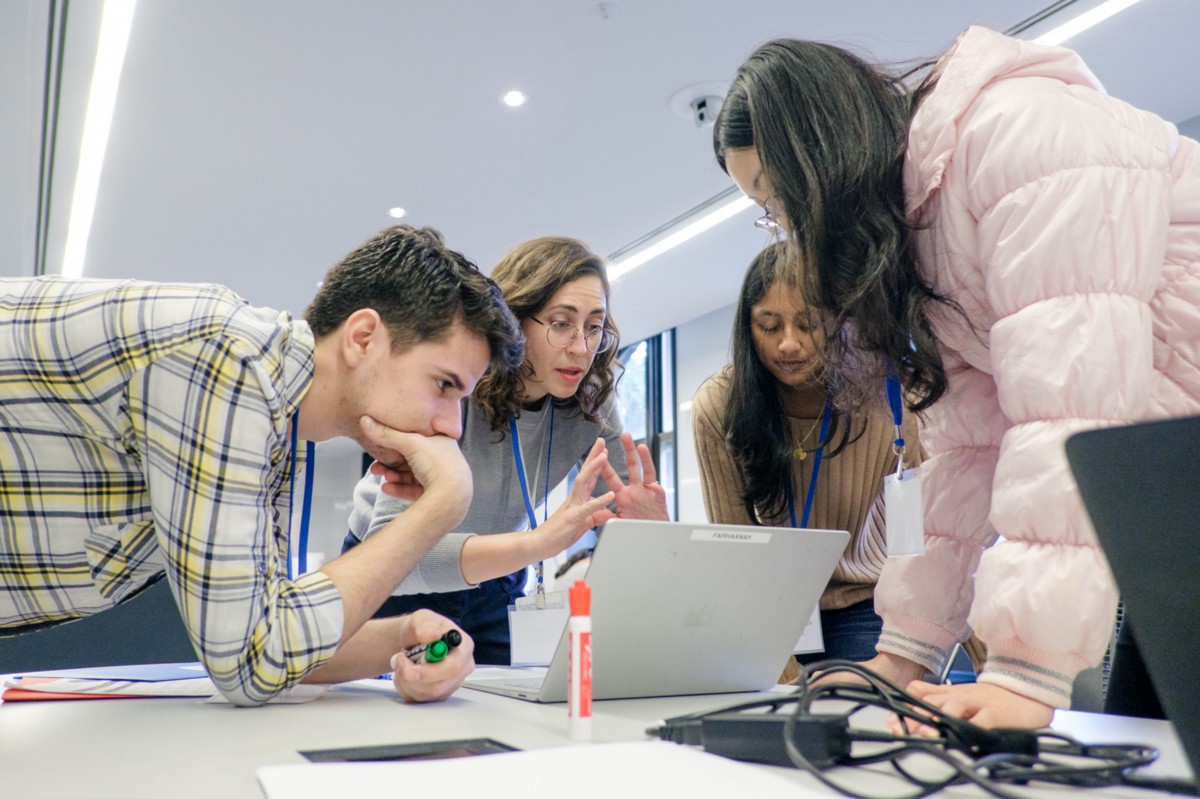Students Design Health Care Technology Prototypes at 2018 Rothberg Catalyzer Makerthon
Students spent a weekend finalizing designs and pitching health care technology prototypes to a panelist of judges. Penn Health-Tech organized the event, which took place at Penn’s School of Engineering and Applied Science.
By Jacob Williamson-Rea

Students at Penn’s second annual Rothberg Catalyzer Makerthon raced to finalize innovative health care technology devices during a 30-hour event spanning the weekend of October 13–14. Student teams collaborated on projects they would present to a panel of judges made up of clinicians, engineers and health care entrepreneurs.
The event was organized by Penn Health-Tech: Center for Health, Devices, and Technology, which combines expertise from Penn Engineering and Penn Medicine to propel advancements in novel health care technologies that address clinical needs.
The Grand Prize of $10,000 was awarded to Samsom, a group of freshmen from the College of Arts and Sciences and The Wharton School. The team designed an affordable bottle-and-straw system that makes it easier for patients to take medications. Second-place finishers designed a PillBot prototype, which combines a secure and affordable medication reminder and pill dispensing system connected to an app. Third place went to CaviLight, a team made up of students from the Penn School of Dental Medicine, who designed a smartphone attachment that uses a camera and fluorescence to detect dental decay and plaque outside of the office. Second and third-place winners won $2,500 and $1,000, respectively.

Victoria Berenholz, Penn Health-Tech’s executive director, says this year’s Catalyzer Makerthon was built upon last year’s success.
“We had about a third of last year’s competitors return,” she says. “There were lots of new students from a variety of Penn schools, and there were even teams made up of students who met at last year’s Catalyzer Makerthon that had decided to join forces this year.”
This year, each student team had a devoted clinical mentor from Penn Medicine or the Children’s Hospital of Philadelphia, as well as a technical mentor from the School of Engineering and Applied Science.
“This provided them with expertise and mentorship for how to de-risk the clinical problem they were solving for and tackle prototyping challenges,” says Berenholz.
Teams applied for the Makerthon in September. They then spent several weeks sharpening their ideas in design studio workshops organized by Penn Health-Tech. One studio, co-led by Dan Whitzer of Independence Blue Cross and Flaura Winston, Scientific Director of the Center for Injury Research and Prevention at CHOP, examined the processes for identifying problems in health care, how best to address those problems, and how to interview clinicians for their input.
The second studio, directed by Eric Sugolski, president of Smithwise, a medical device development company, focused on adopting an efficient prototyping mindset while innovating and de-risking.
“We want to spur new innovation within the Penn community in the health-tech space, as well as accelerate the development of these technologies,” says Berenholz. “We’ll continue to provide mentoring and coaching connections for teams that choose to continue working on these projects. Several of this year’s mentors have expressed their interest in continuing with teams as well.”

Berenholz says she was impressed by the collaborative environment among the competitors. One team developed a project called dentel.ai, a portable device that allows users to take dental screenings in areas that lack the relevant resources. The dentel.ai team and the third-place winning team CaviLight worked together to draw from one another’s expertise. Consisting of students from the Integrated Product Design program, a joint program between Penn Engineering and Penn Design, dentel.ai passed on knowledge about prototyping and design, while CaviLight traded back details about approaching clinical care.
“I loved the Makerthon,” says freshman Noah Zawadzky, a member of Team Sansom, from Spring Lake Heights, New Jersey. “It was very social, not only because of the collaboration among my teammates, but because of the conversations with the other teams as well. It was also wonderful to receive opinions from well-respected members of the health care technology field.”
The Rothberg Catalyzer at Penn is the student-facing project of Penn Health-Tech’s overall mission to accelerate health care technology innovation.
This event was made possible by scientist and entrepreneur Dr. Jonathan Rothberg, who made a three-year donation to spark interdisciplinary innovation so that students can learn about the process of making and innovating.
